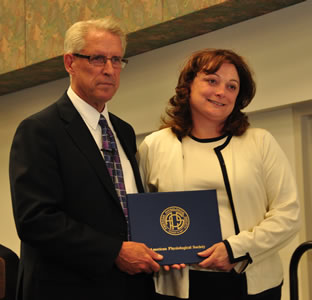Assistant Professor Kelly Suter receives prestigious American Physiological Society award

Assistant Professor Kelly Suter (right) receives the APS award

Assistant Professor Kelly Suter (right) receives the APS award
(May 25, 2010)--Kelly J. Suter, UTSA assistant professor of computational biology in the College of Sciences and the Neurosciences Institute, recently received the 2009 Arthur C. Guyton Award for Excellence in Integrative Physiology and Medicine from the American Physiological Society (APS). Established in 1887, the APS is the nation's premier professional organization for physiology researchers.
Presented annually, the Arthur C. Guyton Award recognizes a pre-tenure investigator for demonstrating outstanding promise in research on feedback control systems, quantitative modeling and integrative physiology. Suter received the award for developing a research program investigating the physiological processes underlying the secretion of the gonadotropin-releasing hormone (GnRH). A hormone secreted in the brain's hypothalamus, GnRH is required for sexual reproduction.
Suter's research targets the GnRH "pulse" generator, the mechanism the brain uses to secrete intermittent bursts of GnRH, which reach their highest levels during adolescence. Her research findings have generated more than two dozen book chapters and scholarly publications including articles in the Journal of Visualized Experiments, The Journal of Physiology and the Journal of Computational Neuroscience.
"When we make progress in science, we stand on the shoulders of giants," said Suter. "Arthur Guyton was a giant, a giant scientist, a giant mentor and a relentless advocate for young people in science. I am humbled to have the work of my laboratory acknowledged in his name."
The American Physiological Society, which sponsors the Guyton award, supports the study of physiology from single cells to whole animals.
"Ultimately, what we learn about physiology and the cellular and neuronal level needs to translate into whole-animal physiology and behavior," Suter said. "This is how basic research leads to improvements in our health and well-being."
Events
Have questions about making your OER accessible on UTSA Pressbooks? The OER Team and the Digital Accessibility are ready to answer them! Bring your questions about OER and accessibility and receive guidance from our two teams.
Virtual Event (Zoom)In this workshop, attendees will be introduced to Pandas, a Python tool for working with data easily. It makes it simple to organize and analyze information when data is organized and categorized, like spreadsheets or tables.
Group Spot B, John Peace LibraryDía en la Sombrilla, formerly Fiesta UTSA, is a festival hosted each spring as a part of Fiesta® San Antonio events. Sponsored by Roadrunner Productions, the event features music, food, confetti, games, event t-shirts, and more.
Sombrilla Plaza, Main CampusCovidence is a systematic & scoping review tool used to streamline the process of screening and reviewing articles. Using this software, research teams can easily import studies, perform automatic deduplication, and extract data using templates. This workshop will show attendees how to start a review in Covidence, add collaborators, and get started on screening.
Virtual (Zoom)In this workshop, attendees will be introduced to Pandas, a Python tool for working with data easily. It makes it simple to organize and analyze information when data is organized and categorized, like spreadsheets or tables.
Group Spot B, John Peace LibraryEach fall and spring semester, students convene at the Main Campus at UTSA with booths, ideas and prototypes. A crowd of judges, local organizations, students, faculty and sponsors walk around and talk to the students about their projects and ask questions. Students get the real-life experience of "pitching" their project with hopes of getting funding or support to move to the next level.
UTSA Convocation Center, Main CampusJoin the doctoral candidates for the Doctoral Conferreal Ceremony and celebrate their accomplishments.
Arts Building Recital Hall, Main Campus

